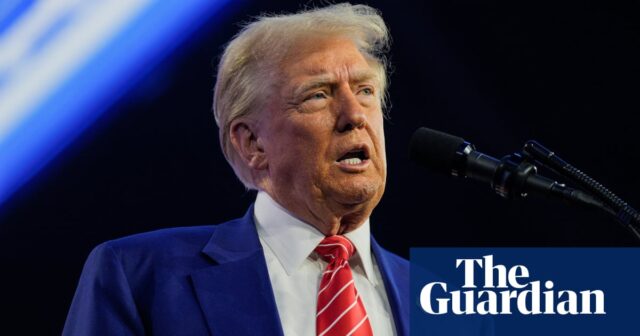A judge on Friday set Donald Trump’s sentencing in his hush-money case for 10 January – little over a week before he is due to return to the White House – but promised not to jail him.
Judge Juan Merchan, who presided over Trump’s trial in New York, denied the president-elect’s motion to dismiss the case due to his election victory in November. He said Trump is expected to appear for sentencing either in-person or virtually.
But Merchan signalled in an 18-page written decision that he does not intend to impose a prison sentence since prosecutors “concede they no longer view [it] as a practicable recommendation” in the light of Trump’s election win in November.
A sentence of “unconditional discharge” – meaning no custody, monetary fine or probation – would be “the most viable solution”, Merchan wrote.
Even so, the sentencing would be a high profile reminder that America is about to swear in a president with a criminal record for the first time. However, Trump could yet ask an appeals court to intervene and postpone the sentencing.
The surprise development marks yet another twist in the singular case.
Trump was convicted in May of 34 counts of falsifying business records. The case involved an alleged scheme to hide a hush money payment to the adult film performer Stormy Daniels in the last weeks of Trump’s first campaign in 2016. The payout was made to keep her from publicising claims she had sex with the married Trump years earlier.
Trump pleaded not guilty and claimed, without evidence, that he was a victim of political persecution. On Friday his spokesperson, Steven Cheung, said in a statement: “This lawless case should have never been brought and the Constitution demands that it be immediately dismissed.
“President Trump must be allowed to continue the Presidential Transition process and to execute the vital duties of the presidency, unobstructed by the remains of this or any remnants of the witch hunts. There should be no sentencing, and President Trump will continue fighting against these hoaxes until they are all dead.”
Trump was initially scheduled to be sentenced on 26 November but Merchan pushed that back indefinitely after the Republican nominee defeated vice-president Kamala Harris in the 5 November election.
The postponement allowed the defence and prosecution to weigh in on the future of the case. Trump’s lawyers urged Merchan to toss it out. They said it would otherwise pose unconstitutional “disruptions” to the incoming president’s ability to run the country.
Merchan rejected that argument, writing that setting aside the jury’s verdict would “undermine the Rule of Law in immeasurable ways”.
Merchan also concluded that the supreme court’s ruling that presidents have immunity from prosecution for “officials acts” does not shield the president-elect. “Accordingly, a President-elect is not permitted to avail himself of the protections afforded to the individual occupying that Office,” the judge wrote.
The judge said he found “no legal impediment to sentencing” Trump and it was “incumbent” on him to sentence Trump prior to his swearing in on 20 January.
“Only by bringing finality to this matter” will the interests of justice be served, Merchan wrote.
Prosecutors with Manhattan district attorney Alvin Bragg’s office had suggested several options for Merchan, including delaying the sentencing until Trump, 78, leaves the White House in 2029, or guaranteeing a sentence that would not involve prison time.
Falsifying business records is punishable by up to four years in prison but incarceration is not required. Before his election victory, legal experts said it was unlikely Trump would be locked up due to his lack of a criminal history and advanced age.
Trump was charged in three other state and federal criminal cases in 2023: one involving classified documents he kept after leaving office and two others involving his efforts to overturn his 2020 election loss.
He pleaded not guilty in all three cases. The justice department moved to dismiss the two federal cases after Trump’s election victory. Trump’s state criminal case in Georgia over charges stemming from his effort to overturn his 2020 election loss in that state is in limbo.






